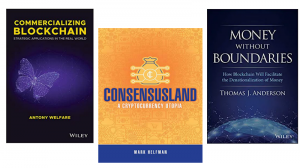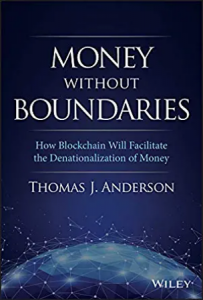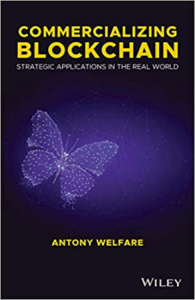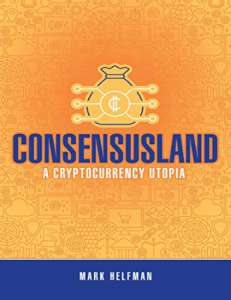
The three books, each available in various formats including online, are:
- Commercializing Blockchain
- Money without Boundaries
- Consensusland
 Commercializing Blockchain (Antony Welfare, Wiley 2019)
Commercializing Blockchain (Antony Welfare, Wiley 2019)
Sub-titled ‘Strategic Applications in the Real World’, Commercializing Blockchain seeks to be a practical guide to blockchain. It illustrates how blockchain can be:
- revolutionary technology
- used to transform governments, businesses, enterprises and entire communities.
The author, Antony Welfare, draws from his experience with:
- global retailers
- global technology companies
- the UCL Centre for Blockchain technologies
- the UK government
- the (UK) Retail Blockchain Consortium
- and other sources.
This enables him to present real-world case studies on the use and benefits of blockchain. His specific topics include:
- financial transactions
- tokenisation
- identity management
- supply chain transparency
- global shipping and freight
- counterfeiting.
In seeking to provide practical guidance for blockchain transactions in business operations he:
- gives practical guidance for blockchain transactions in business operations (without requiring technology/technical expertise)
- demonstrates how blockchain can add value and bring increased efficiency to commercial operations
- describes the the essential components of blockchain (including traceability, provenance, certification and authentication).
Money without Boundaries (Thomas J Anderson, Wiley 2019)

To him, when comparing other currencies, blockchain-managed money markets are more straightforward and transparent. They are, he argues, easier to monitor, to understand and to assess the quality of ‘full-faith and credit’.
In Money Without Boundaries he discusses how not only money but also the process of borrowing and lending might evolve to deliver a fully trusted, secure, transparent and open architecture environment. In so doing, he
- demonstrates how blockchain technology enables full transparency
- explains how blockchain makes it possible for money to become a commodity
- examines how a fully market-based, decentralised and self-regulating system could have implications stretching throughout the existing global financial system
- shows how everyone might benefit if they have the opportunity to compete on ‘full faith in credit’.
Consensusland (Mark Helfman, Lulu Publishing Services, 2018)
In this modern analogue of Gulliver’s Travels, a businessman receives the offer of a lifetime from the tiny, island country of Consensusland. The catch is troubling: give up everything you know about business and finance and accept the power of blockchain.
Consensusland is fiction. Its story is about an invented country’s implementation and use of adopting a futuristic economic system based on the use of a cryptocurrency, smart phone apps, QR codes, etc. It involves an invitation to a pharmaceutical company where the hope and goal of the various Consensusland officials is to persuade the company of the advantages of relocating to Consensusland.
The novel is short (99 pages). Even so, the way it unfolds describes how a blockchain-based economy might be structured and the transactions which can take place. Adding to the discussion, questions arise as to where are the other businesses activities as well as the playing out of the pharmaceutical company’s decision processes.
In effect the author has created an exploration of new methods of commerce conducted through a cryptocurrency, charmingly called the ‘Connie’.
Enterprise Times: what does this mean
Being constrained by Covid-19 offers the opportunity to learn. In their different ways, each of these three blockchain books can distract while also preparing for the day when ‘normal business resumes’. (For a possible alternative, see here.)
If you are interested in:
- Commercializing Blockchain is a book appropriate for developing and deploying blockchains, particularly in areas like retail, supply chain and consumer goods
- cryptocurrency, money, monetary theory or understanding how the applied uses of blockchain technology will change your everyday life; Money without Boundaries makes for reading which challenges
- an entertaining distraction, combined with sci-fi, then Consensusland is appropriate.

 Commercializing Blockchain (Antony Welfare, Wiley 2019)
Commercializing Blockchain (Antony Welfare, Wiley 2019)

























